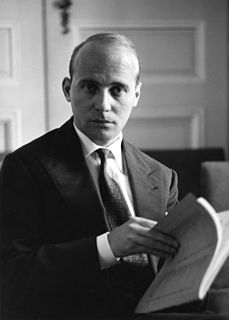Related Research Articles

Matthias Goerne is a German baritone.
Júlia Várady is a Hungarian-born German soprano who started out as a mezzo-soprano.
Hanspeter Kyburz is a contemporary Swiss composer of classical music, known for applying electronic music techniques to his productions.
Andrea Molino is an Italian composer and conductor. He has first attracted international attention through a video/music theatre work, Those Who Speak In A Faint Voice, a project about capital punishment, and later through the multimedia music theatre projects Credo, and Winners.
Richard Ayres is a British composer and music teacher.
PAN.OPTIKUM Action Theatre is a theatre ensemble based in Freiburg im Breisgau, Germany.

Oscar Strasnoy is a French-Argentine composer, conductor and pianist. Although primarily known for his stage works, the first of which Midea (2) premiered in Spoleto in 2000, his principal compositions also include two secular cantatas and several song cycles.
The Temptation of St. Anthony is an opera rooted in the gospel tradition based on the novel The Temptation of Saint Anthony by Gustave Flaubert, directed by Robert Wilson with book, libretto and music by Bernice Johnson Reagon and costumes by Geoffrey Holder. The production debuted in June 2003 as part of the RuhrTriennale festival in Duisburg Germany with Carl Hancock Rux as Saint Anthony and Helga Davis as Helarion. Subsequent performances included the Greek Theater in Siracusa, Italy; the Festival di Peralada in Peralada, Spain; the Palacio de Festivales de Cantabria in Santander, Spain; and Sadler's Wells in London, Great Britain; the Teatro Piccinni in Bari, Italy; the Het Muziektheater in Amsterdam, Netherlands; the Teatro Arriaga in Bilbao and the Teatro Espanol in Madrid, Spain. The opera made its American premiere at the Brooklyn Academy of Music's BAM Next Wave Festival in October 2004. The official "world premiere" was held at the Paris Opera Garnier becoming the first all African American opera to perform on its stage since the inauguration of the Académie Nationale de Musique - Théâtre de l'Opéra in 1875.
The Wittener Tage für neue Kammermusik is a music festival for contemporary chamber music, jointly organised by the town Witten in the Ruhr Area and the broadcasting station Westdeutscher Rundfunk (WDR). The concerts take place over a weekend at the end of April or in early May, and concentrate on world premieres of small-scale works, more than 600 as of 2010. They are broadcast worldwide via the European Broadcasting Union.

The Internationale Maifestspiele Wiesbaden is a theater festival in Wiesbaden, Germany. Established in the late 19th century after the Bayreuth Festival, the festival is one of the most distinguished international theatre and music festivals in the world. It is presented annually in May at the Hessisches Staatstheater Wiesbaden, the State Theatre of Hesse in the capital Wiesbaden. The festival currently features performances of operas, ballets, plays and musicals. Visiting companies, mostly from European theaters, present their recent productions along with performances of the Theater Wiesbaden. Concerts from a wide array of music genres are featured as well as artistic circus acts and modern dance presentations. Lectures, recitals, cabaret performances, art showings and readings are also part of the program.

Gisela! oder: Die merk- und denkwürdigen Wege des Glücks is an opera by Hans Werner Henze.
Familie Flöz is a German-based theatre company that uses humour, masks, improvisation, mime and physical comedy to create family-friendly shows. The company was begun in 1994 by Hajo Schüler and Markus Michalkowski, acting and mime students at the Folkwang University of the Arts in Essen in the Ruhr Area of Germany, and fellow Michael Vogel joined soon thereafter. Their first production, a comic piece on life on a construction site, premiered at the university in 1994. A few years later, the Familie Flöz performed at the Cologne Comedy Festival and the Kulturbörse Freiburg.
Elena Mendoza is a Spanish composer of contemporary music and musical theatre.

Marietta Piekenbrock is a German art curator, dramaturge, author and a cultural manager. Her projects combine theatre, dance, performances and music with cultural history, architecture and everyday life. As an artistic manager of the Cultural Capital of Europe RUHR.2010 and Istanbul.2010, and for the Ruhrtriennale 2012-14, she invited international artists and curators to collaborate with the local cultural participants and players on developing new artistic projects in areas of radical social change. Her programmes of events and initiatives made a strong case for sustainable cultural practice. Her 2012 series of events "No Education" promoted a new discourse on the relationship between art, children and education.
Marga Höffgen was a German contralto, known for singing oratorio, especially the Passions by Johann Sebastian Bach, and operatic parts such as Erda in Wagner's Der Ring des Nibelungen, performed at the Bayreuth Festival and Covent Garden Opera in London between 1960 and 1975.
Stefan Soltész is an Austrian conductor of Hungarian origin. Trained in Vienna, he was from 1997 to 2013 he was artistic director of the Aalto Theatre and Generalmusikdirektor in Essen, leading the opera house to international recognition.
Ruthild Engert-Ely was a German operatic mezzo-soprano and alto.
Karola Theill is a German pianist and Lied accompanist.
Titus Engel is a Swiss conductor. In addition to his involvement with symphonic works of the 19th and 20th centuries, he has a great passion for baroque music and historically informed performance, unusual projects and concert formats as well as contemporary opera.

The Ensemble Resonanz is a German string ensemble that combines the performance and promotion of Neue Musik with the interpretation of classical repertoire. It sees itself at the interface between chamber orchestra and soloist ensemble for new music.The ensemble is based in Hamburg, where it is an Ensemble in Residence of the Elbphilharmonie.
References
- Meisterklasse Fischer Dieskau mit Eric Schneider auf DVD Classic Archive EMI DVB 3101959
- Recension Orpheus RuhrTriennale 2004 OMM Website
- Musica Sacra Paderborn 2007 CV Matthias Rettner Website
- Unesco-ITI Members Website
- Theatre PAN.OPTIKUM Website